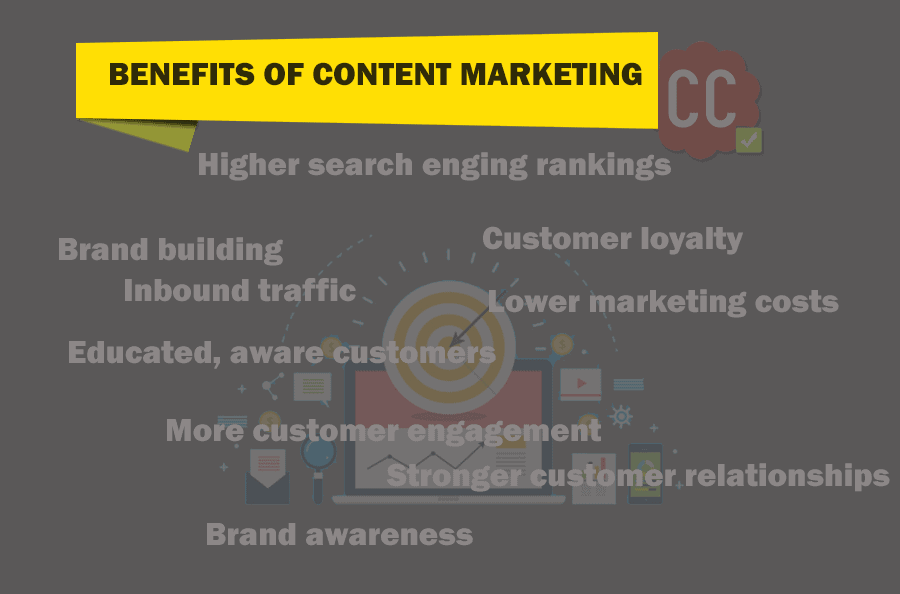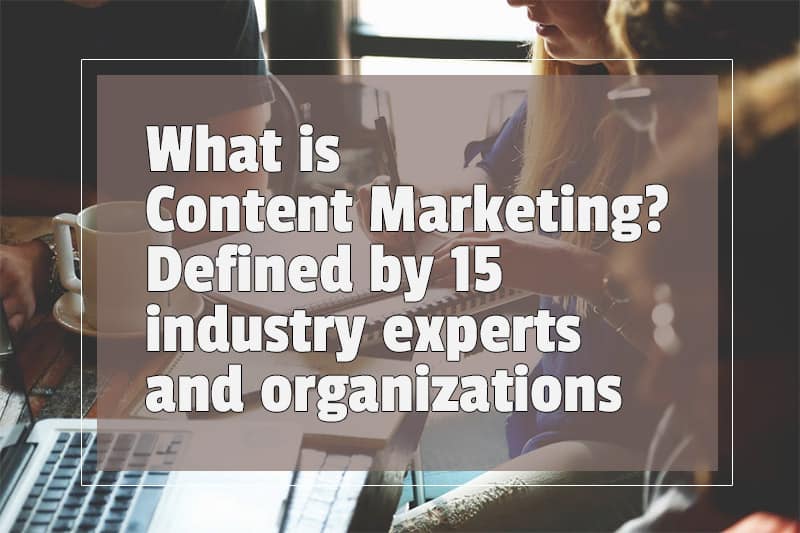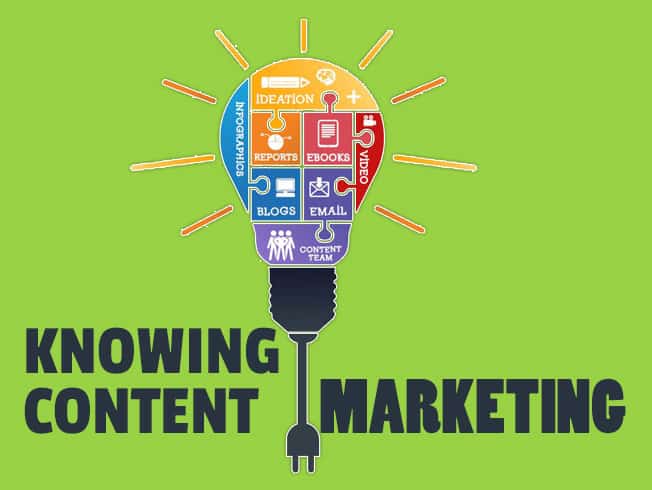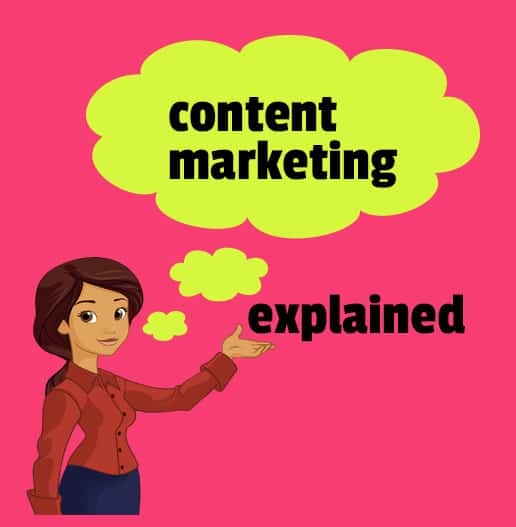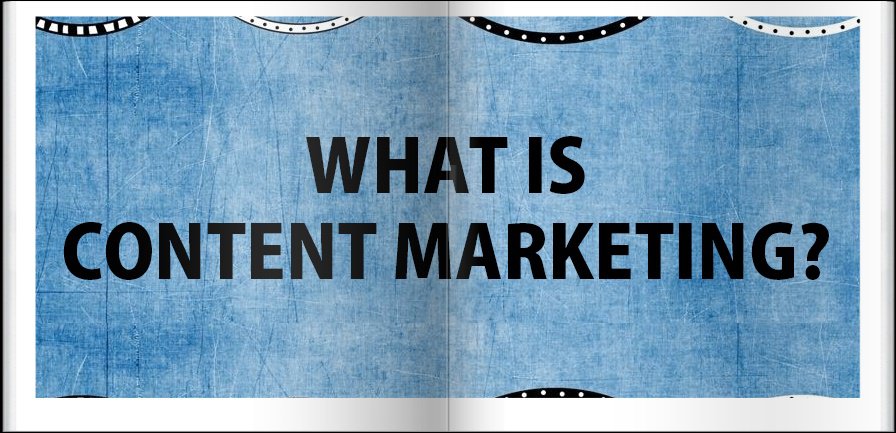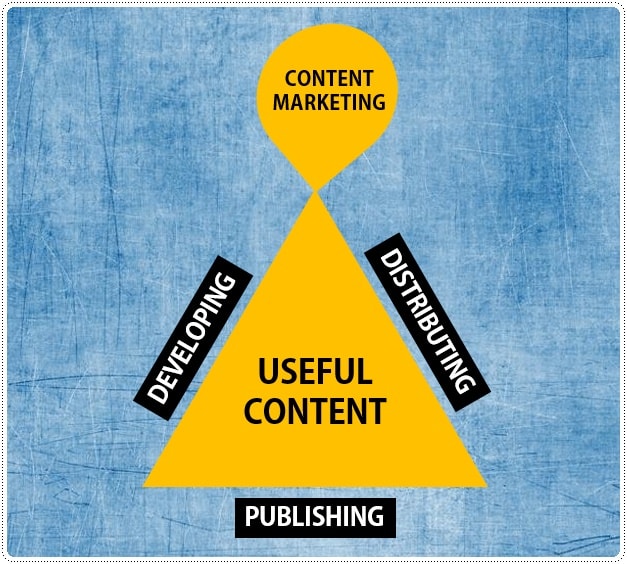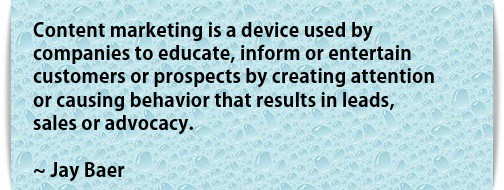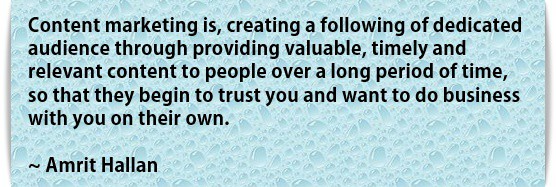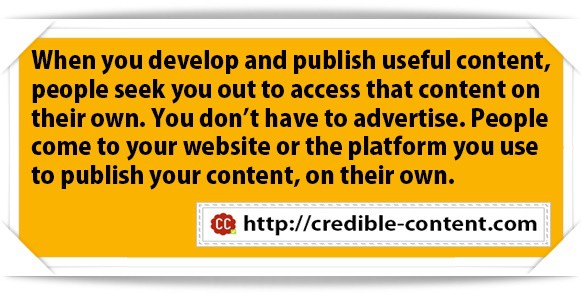In this blog post you are going to learn about some indisputable benefits of content marketing.
I have never advertised my content writing and content marketing business.
I have “boosted” a few posts on Facebook and recently I also “promoted” an update on Instagram just to see how it affected my followers rate (I got just one follower), but other than these, I have never used the conventional tools, even AdWords, to promote my business.
It is just content marketing.
When and why did I start using content marketing to promote my services?
In the very beginning itself. Back then, there was no concept of content marketing, but I knew that if I published my tutorials and articles on other article-publishing and tutorial-publishing websites, it would bring traffic to my own website.
Blogging wasn’t invented yet and I used to manually create HTML, PHP and ASP pages on my website, linking to them from a single web page (just like we have the blog home page these days linking to the latest blog posts).
I didn’t have money to spend on banner ads or link ads and to be frank, I never even found them attractive. Promoting my services through content always fascinated me. I got a high.
I promoted my web design services through content marketing in the very early 2000s and then post 2005, I have really started using content to promote my content writing services.
I was so enamored with text that once I had my website just made of text, not a single image.
Of course, in between I have lost track, gotten distracted or gotten busy in other pursuits, but whenever I have come back to promoting my website, I have solely relied on this form of marketing and promotion.
What are the benefits of content marketing?
Listed below are some indisputable benefits of content marketing:
Brings down marketing costs
Conventional advertising and marketing can be costly. You pay for every view. You pay for every click. You pay for every exposure. You pay for every engagement.
With content marketing, yes, you pay for good quality content, but it is a one-time cost. Some pieces of content work, and some don’t, but the collective benefit that you get from it is far more potent than the benefits that you get from conventional advertising and marketing.
You need to spend more on conventional advertising and marketing because people notice you as long as you are paying. Otherwise, it is “out of sight out of mind”.
Improves your conversion rate
Since, through content marketing you are building relationships and not simply promoting your products and services, your conversion rate is better.
By the time people decide to become your paying customers and clients, they thoroughly know about you and whatever you are offering. Through relevant content, you have educated them, you have informed them, you have also helped them.
Makes it easier to find you
One of the most important parts of content marketing is spreading your content on different platforms.
When you publish your content and then post the links on social networking and social media platforms like Facebook, Twitter and Instagram, people like it or share it on their own timelines. Hence, people on their timelines can find your content.
Other bloggers and publishers who appreciate your insight link to your content through their own blog posts, articles and web pages, giving you more exposure.
You also publish your content on other platforms exclusively, making it easier for people over there to find you.
Improves your SEO naturally, organically
Although this is one of the most common reasons why my clients come to me for my content writing and content marketing services, I always advise them to let their search engine rankings improve naturally, organically, based on the strength of the goodness of their content.
But this is a reality: if you persist with relevant, meaningful content marketing, it naturally improves your SEO. You don’t have to separately focus on improving your search engine rankings.
In fact, over the past decade, Google has been incorporating changes into its ranking algorithms to make sure that only those websites and links rank higher that have relevant, high-quality content on them.
Brings more inbound traffic
Since content marketing makes it easier for people to find you all over the web and since it also improves your search engine rankings organically, naturally, you get more inbound traffic.
The best quality of inbound traffic is you are not telling people to visit your website or check out your link. People come on their own.
When people come to your website or blog on their own, they are more receptive to your message. They’re already tuned into what you’re trying to tell them. Hence, they convert easily compared to those who are drawn to your website through some advertisement.
Encourages engagement
The more people engage with you, the more they become familiar to your presence, and the easier it gets for them to do business with you.
Even when people come across your website (through an advertisement), they don’t do business with you because they don’t know you. At the moment they don’t trust you because you haven’t engaged them in meaningful interactions.
Without content, they haven’t gotten a chance to be helped by you, to appreciate your presence on the Internet.
Builds brand awareness without intrusion
Through content marketing, people come across your brand when they are accessing quality content rather than ads they will gladly ignore or block.
With every business available with just a few clicks or a few taps, brand visibility is very important. Whether you want to buy a highly expensive iPhone or one of the cheapest Android phones, they both are immediately available to you.
When you publish and broadcast/disseminate useful content people begin to relate your brand with quality content and hence, establish a positive association. This further boosts your conversion rate because people who already have a positive perception about your brand readily become your customers and clients.
Educates your customers
There are many products and services that need education before they can be used, for example CRM.
For a very long time I have been planning to start using a CRM to keep track of customer queries, lead nurturing and following up. Unfortunately, no online CRM service has beginners tutorials on how to start using CRM for a very small business.
I’m pretty sure whichever website is able to explain to me, I’m going to use its service.
Another example is content marketing. Still, there are many people who don’t understand this concept. So, they need to be educated. They need to be told the benefits of publishing high-quality content on an ongoing basis.
Builds and fosters stronger customer relationships
Many companies claim that more than 40% of their business comes from existing customers and clients. This is true even for my own business. In fact, more than 50% of my work comes from my existing clients.
Through well-crafted content marketing (especially email marketing), you can constantly keep in touch with your existing customers and clients by providing them valuable information.
You can also keep your existing customers and clients engaged through social networking platforms.
Remember that it just takes a few seconds for a customer to switch to another product or service. This switch is so important that many businesses offer a year of service free of cost just so that people move to their service from the other service.
But if you have built a strong relationship through quality content, your existing customers and clients won’t make that switch, even when prompted.
Builds your communication platform
It isn’t true that only big businesses and media houses can have their own communication platforms. Even smaller businesses can develop an audience that pays attention to their messages.
The communication platform can be your blog or your mailing list or even your social media or social networking profile – wherever your audience comes to access your content.
The benefit of having a communication platform is that you have an audience whenever there is something critical you want to say and it is very important that a certain number of people get the message.
Suppose, you’re introducing a new feature in your product and you would like to tell people the benefits of upgrading.
You want to make new offers.
You need to do damage control if someone has been leaving bad reviews just to tarnish your image.
Search engines need a place to regularly crawl and index new content and if you have a vibrant platform, the frequency of crawling and indexing increases.
Establishes you as an industry expert
Naturally, when you regularly share your knowledge, wisdom and insight, people begin to believe that you are an industry expert.
If you are an app developer and you regularly share your programming techniques and other app development experiences through your blog, whom do you think prospective clients choose when they need an app developer? Someone who is totally mum about his or her app development profession or someone who constantly communicates and engages with prospective clients?
Generates long-term, lasting traffic
As described above, your content is a constant source of traffic. As long as your links exist in the Google index, as long as people are able to find your content, you are going to get traffic on your website or blog.
Once you have increased your content wealth, once many people have linked to your content, once many people have shared your content, your links are all over the place.
Depending on where you are, if you search for “email writing services” you will find my link somewhere on the first page on Google. Now, the position has been there for more than 1 ½ years now, even longer. This link has been constantly generating quality leads for me and I don’t have to pay for it.
If I needed to advertise on AdWords, I would have to pay for every click Google sent my way. Through the above-mentioned link, whether I get 100 clicks every month or 10,000, I don’t have to spend money. It is an ongoing source of traffic for me.
Brings down your bounce rate
Your bounce rate is how many people leave your website without checking out other links your website or blog, after directly coming to a particular link.
A higher bounce rate is bad for your SEO. It is also bad for your conversion rate.
Quality content makes people stick around. If they like what you have published on the current link, they would also like to check out other web pages and blog posts on your website and this tells Google and other search engines that you have relevant content, and hence, your links should be ranked higher.
Helps you grow your mailing list
The benefits of having a mailing list that you have built on your own can only be realized when you have built a mailing list for yourself.
Since building your own mailing list requires effort, persistence and perseverance, most of the people fail to realize its importance.
Having your own mailing list is very important for engaging your prospective and existing customers and clients.
A persistent content marketing strategy and email marketing strategy are interlinked. Without high-quality content it is not possible to build your own mailing list unless you engage in other tactics like offering a case study in lieu of subscribing to your email updates, or offering a very useful e-book, or something like that.
When you publish quality content people expect the same content in your email updates and hence readily subscribe. Also, since your content is so useful, they don’t want to miss it. If you promise them that as soon as you publish something on your website or blog you’re going to send them an email update, they readily subscribe.
Gives you an edge over your competitors
A good thing about content marketing is it democratizes marketing. There was a time when only big businesses with lots of money could use marketing, but with content marketing, business of any size can use it.
Yes, you do need some money to generate quality content, but more than that, you need ingenuity and persistence.
Your competitors won’t be able to gain even a fraction of visibility with conventional advertising and marketing that you can gain with strategic content marketing.
With helpful and relevant content, you make it easier for people to do business with you rather than with your competitors.
I gave you an example of CRM above. Whichever website explains better how to leverage its CRM, is going to get more customers.
Reduces your support cost
Content marketing also involves publishing lots of helpful content on your website and blog, for example the detailed FAQs section.
People may have many questions. They may have many issues. They might be confused about using your product or service.
Normally they contact your support. But these days, contacting support is a hassle in itself and most of the people want to avoid it.
Helpful content on your website can provide all the information people need to be able to use your product or service properly.
When people contact you for support, you can prepare a list of questions and queries that they have and then publish their answers on your website.
The next time if another person has the same question, rather than calling you or writing you an email, he or she can simply check the section that contains answers to the most commonly asked questions.
Builds a community around your business
Apple built a community around its business and look how great the company does.
Amazon has encouraged a community of “skill” developers for its range of Amazon Echo gadgets and now they are selling millions of these gadgets.
The same goes for Android-based mobile phones. The examples are innumerable.
Building a community builds a support system. The community helps you refine and evolve your product or service. You instantly get feedback and since your community is devoted to your brand, you mostly get positive/encouraging feedback.
You want to introduce something but before making it available in the market, you would like a few people to test it. You can use your community for that.
Concluding remarks on the benefits of content marketing
Over the years I have learned that content marketing benefits only those who understand its benefits. Yes, it is like “Laws of Attraction”.
If you want to use it just because you have read a few blog posts and articles on content marketing and you think a nice strategy can be implemented without spending some money and effort, you are going to waste your effort and lose your money.
You benefit from content based marketing only in the long run, when you have nurtured it and allowed it to blossom into in its own entity.
You cannot “trick” it into bringing you business success. This is the reason why it works for everyone who seriously pursues it.
What makes content marketing successful?
Your understanding of it. Otherwise, you’re going to implement it halfway through and then lose interest or courage, or both.
It is an ongoing activity. Just like your other business activities, it has to go on.
For example, if currently you feel that you need to publish 2 blog posts every week, you may have to publish these 2 blog posts every week for an indefinite number of years if you really want to benefit from content marketing.
What’s the purpose then, you may ask?
Because it increases your business and even if you go on publishing just 2 blog posts every week, compared to the growth of your business, the cost of publishing these 2 blog posts will move towards negligible.

